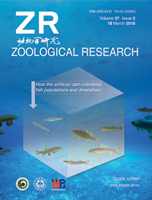
|
Zoological Research
Kunming Institute of Zoology, Chinese Academy of Sciences
ISSN: 2095-8137
Vol. 31, No. 3, 2010, pp. 644-650
|
 Bioline Code: zr10089
Bioline Code: zr10089
Full paper language: Chinese
Document type: Research Article
Document available free of charge
|
|
|
Zoological Research, Vol. 31, No. 3, 2010, pp. 644-650
| en |
Positive influence of traditional culture and socioeconomic activity on conservation: A case study from the black-and-white snub-nosed monkey (Rhinopithecus bieti) in Tibet
Zuo-Fu, Xiang; Sheng, Huo; Wen, Xiao & Liang-Wei, Cui
Abstract
Found in the Trans-Himalayas of north-west Yunnan and south-east Tibet, the black-and-white snub-nosed monkey (Rhinopithecus bieti) is one of the world’s most endangered primates. A recent survey indicates that only 15 groups with 2500 individuals remain in the wild. However, the Tibetan Xiaochangdu group may be the only equilibrium group in the field since the last investigation in 1988. To evaluate the effects of traditional culture and socioeconomic activity on biodiversity conservation of R. bieti, we conducted a case study in the Honglaxueshan National Nature Reserve in southeast Tibet from June 2003 to May 2005. Interviews, direct observations, and analysis of socioeconomic data indicated major advantages to the conservation of R. bieti, which included that: 1) traditional culture mainly depended on raising livestock and collecting non-timber products rather than forest planting of Tibetan highland barley; 2) religious beliefs, against to kill any wildlife living on the sacred mountain, were mainly influenced by Tibetan Buddhism; and 3) bigger household numbers were induced by the polyandrous marriage system, which resulted in lower per capita resource consumption than smaller ones.
Keywords
Conservation implications; Rhinopithecus bieti; Socio-economic activity; Traditional culture
|
| |
© Copyright 2010 Kunming Institute of Zoology, the Chinese Academy of Sciences
Alternative site location: http://www.zoores.ac.cn/
|
|
